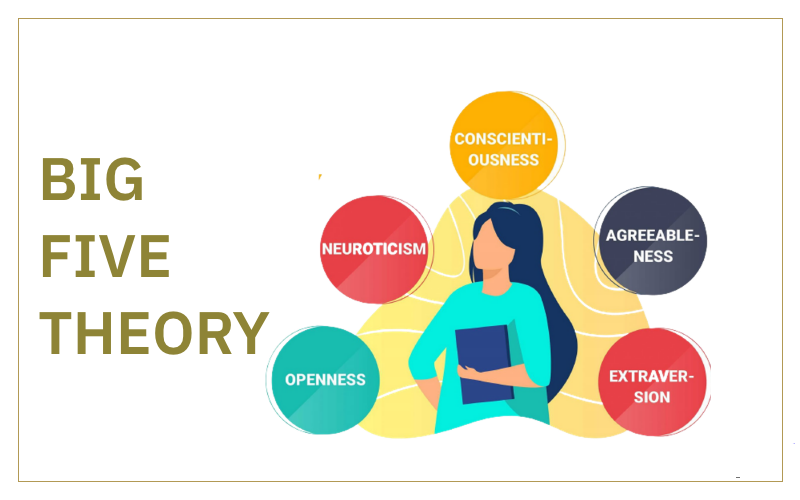Introduction
The Big Five Theory is a model of personality that divides human personality into five broad dimensions: extraversion, agreeableness, openness, conscientiousness, and neuroticism. These five dimensions are often abbreviated as OCEAN.
In the field of software engineering, the Big Five Theory can be used to assess the personality traits of software engineers. By understanding the Big Five personality traits, HR professionals can make better hiring decisions, create a positive work environment, and develop employee training programs that are effective.
The Big Five Theory
The Big Five Theory is a model of personality that divides human personality into five broad dimensions: extraversion, agreeableness, openness, conscientiousness, and neuroticism. These five dimensions are often abbreviated as OCEAN.
- Extraversion is the tendency to be outgoing and sociable.
- Agreeableness is the tendency to be cooperative and compassionate.
- Openness is the tendency to be creative and intellectually curious.
- Conscientiousness is the tendency to be organized and hardworking.
- Neuroticism is the tendency to experience negative emotions such as anxiety and stress.
The Big Five Theory is widely accepted by psychologists and has been used in a variety of settings, including HR and recruitment. In HR, the Big Five Theory can be used to:
- Screen job candidates. By understanding the Big Five personality traits, HR professionals can identify candidates who are likely to be a good fit for a particular role. For example, a sales role might be better suited for someone who is high in extraversion and agreeableness, while a research role might be better suited for someone who is high in openness and conscientiousness.
- Develop employee training programs. The Big Five Theory can be used to identify areas where employees need additional training. For example, employees who are low in conscientiousness might benefit from training on time management and organization skills.
- Create a positive work environment. By understanding the Big Five personality traits of employees, HR professionals can create a work environment that is supportive and productive for everyone. For example, employees who are high in agreeableness might appreciate a work environment that is collaborative and team-oriented.
In recruitment, the Big Five Theory can be used to:
- Create job descriptions. By understanding the Big Five personality traits that are important for a particular role, recruiters can create job descriptions that attract the right candidates. For example, a job description for a customer service role might emphasize the importance of being friendly and helpful, which are both qualities that are associated with high extraversion and agreeableness.
- Screen candidates. During the interview process, recruiters can use the Big Five Theory to assess candidates’ personality traits. For example, a recruiter might ask questions about candidates’ work styles, interests, and hobbies to get a better understanding of their personalities.
- Make hiring decisions. After the interview process, recruiters can use the Big Five Theory to make hiring decisions. For example, a recruiter might decide to hire a candidate who is high in conscientiousness for a role that requires a lot of attention to detail.
The Big Five Theory is a valuable tool for HR and recruitment professionals. By understanding the Big Five personality traits, HR professionals can make better hiring decisions, create a positive work environment, and develop employee training programs that are effective.
Questions for a Software Engineer
here are some screening questions for a software engineer, as per the Big Five Theory:
- Extraversion
- Tell me about a time when you worked on a team project.
- How do you handle working with people who have different personalities than you?
- What do you do to stay motivated when working on a long-term project?
- Agreeableness
- How do you handle conflict with your colleagues?
- What do you do to build relationships with your colleagues?
- How do you give and receive feedback?
- Openness
- What are you passionate about outside of work?
- What are your interests in the field of software engineering?
- What are your thoughts on the future of software engineering?
- Conscientiousness
- How do you stay organized and on track with your work?
- What are your strengths and weaknesses when it comes to time management?
- What are your thoughts on the importance of quality assurance?
- Neuroticism
- How do you handle stress?
- What are your coping mechanisms for dealing with difficult situations?
- What are your thoughts on the importance of mental health?
These are just a few examples of screening questions that can be used to assess a software engineer’s personality traits. It is important to tailor the questions to the specific role and the company culture. For example, a company that values creativity might ask more questions about the candidate’s openness to new ideas, while a company that values teamwork might ask more questions about the candidate’s agreeableness.
It is also important to remember that the Big Five Theory is just one tool that can be used to assess a candidate’s personality. Other factors, such as the candidate’s skills, experience, and education, should also be considered when making a hiring decision.

